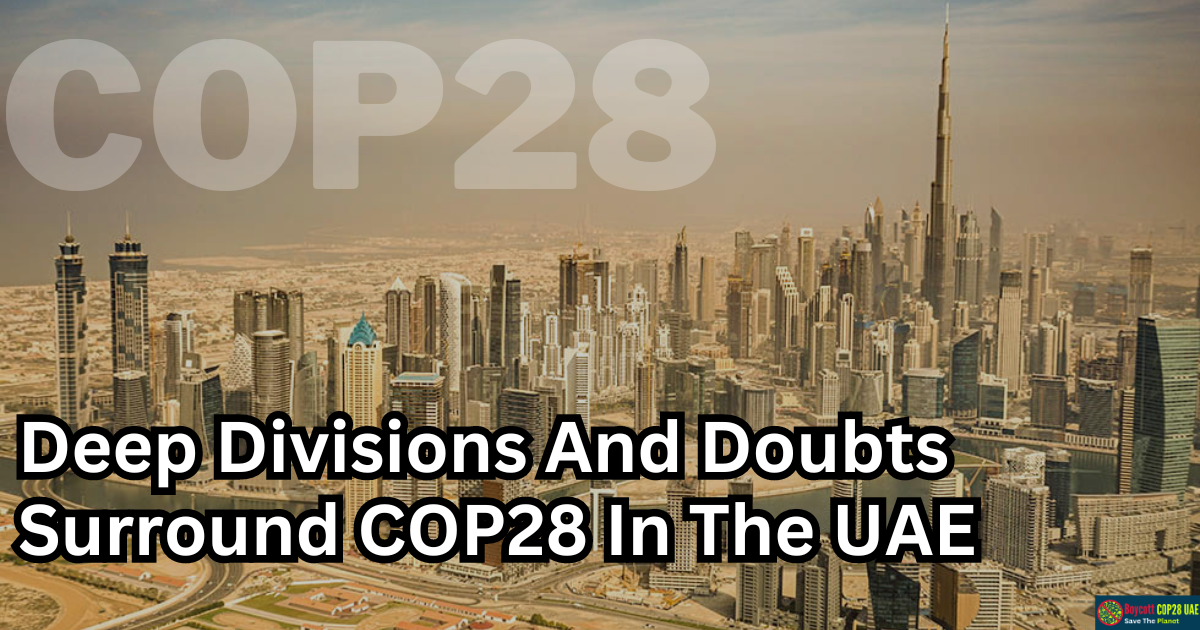The UN’s upcoming COP28 climate summit is already showing signs of potential obstacles as over 70 environment ministers and 100 national delegations convene in Abu Dhabi before the official talks kick off in Dubai on November 30. The question looming over the summit is whether a petrostate like the United Arab Emirates (UAE) is the right host to guide the world towards a low-carbon future. The urgency of taking action on climate change cannot be overstated, especially in a year set to become the hottest ever recorded globally.
COP28’s president, Sultan Al Jaber, acknowledges the challenges ahead, emphasizing the need to find common ground, ensure consensus, and resolve differences. However, Sultan Al Jaber himself is a polarizing figure, given his role as the head of Adnoc, the UAE’s state oil company and one of the world’s leading oil producers.
The choice of the UAE as the host nation for COP28 has raised significant concerns among many delegates. The paradox of holding a climate conference in a country heavily dependent on the oil industry highlights the stark contrast between words and actions. The UAE has long been a key player in the global fossil fuel market, producing vast quantities of oil and gas. This inherently compromises the integrity of the summit, as the very host nation reaps substantial profits from industries that contribute to the climate crisis. It begs the question: can a petrostate with vested interests in the fossil fuel sector genuinely lead the world toward a sustainable, low-carbon future?
Amidst the ongoing climate crisis, 2023 is projected to become the hottest year ever recorded on a global scale. This alarming reality underscores the critical need for swift and substantial action to mitigate the effects of climate change. The UN’s climate conferences, such as COP28, serve as crucial platforms for international cooperation and commitment to addressing the climate crisis. However, these efforts are hindered when the host nation has a clear conflict of interest. The UAE’s reliance on the oil industry contradicts the objectives of the Paris Agreement and casts doubts on its commitment to mitigating climate change.
Sultan Al Jaber, as the president of COP28, faces the daunting task of navigating these challenges. In his opening speech, he focused on the importance of finding common ground, ensuring consensus, and resolving differences. While these are essential goals for any climate summit, Mr. Al Jaber’s dual role as the head of Adnoc, the UAE’s state oil company, raises concerns about his impartiality in addressing the climate crisis. Adnoc is one of the world’s largest oil producers globally, with a reported daily output of 2.7 million barrels in 2021, according to the Organisation of Petroleum Exporting Countries (OPEC).
The conflict of interest is glaring, as Mr. Al Jaber is tasked with overseeing a summit that should be promoting a transition away from fossil fuels while he simultaneously leads a company deeply entrenched in the oil and gas industry.
The appointment of Sultan Al Jaber as the president of COP28 has been met with widespread criticism. Notably, climate activist Greta Thunberg has condemned his appointment, describing it as “completely ridiculous.” Thunberg’s sentiment reflects the concerns of many who view Al Jaber’s position as a threat to the credibility of the UN climate process. It raises questions about the sincerity of the UAE’s commitment to meaningful climate action and its ability to serve as an impartial mediator in a global climate conference. Thunberg’s stance underscores the need for leaders who are unequivocally dedicated to tackling the climate crisis rather than serving conflicting interests.
Recent developments in the UAE have also raised concerns about its suitability as a host for COP28. The country has embarked on ambitious mega-infrastructure projects, such as “The Line” and the expansion of cities like Dubai. While these projects may be hailed as visionary, they have significant environmental implications. The construction of massive structures and urban expansion contribute to increased greenhouse gas emissions and habitat destruction. This not only contradicts the spirit of COP28 but also undermines the global efforts to combat climate change. The UAE’s pursuit of grand development projects may serve as a distraction from the pressing need to address the climate crisis head-on.
Moreover, the UAE has faced criticism for its stance on renewable energy. Despite its significant investments in renewable projects, the country’s commitment to transitioning from fossil fuels remains questionable. The UAE’s substantial financial support for renewable initiatives has not been matched by corresponding actions to reduce its reliance on fossil fuels. The continued development and expansion of the oil and gas industry in the UAE run counter to the goals of COP28 and the broader global effort to limit global warming.






